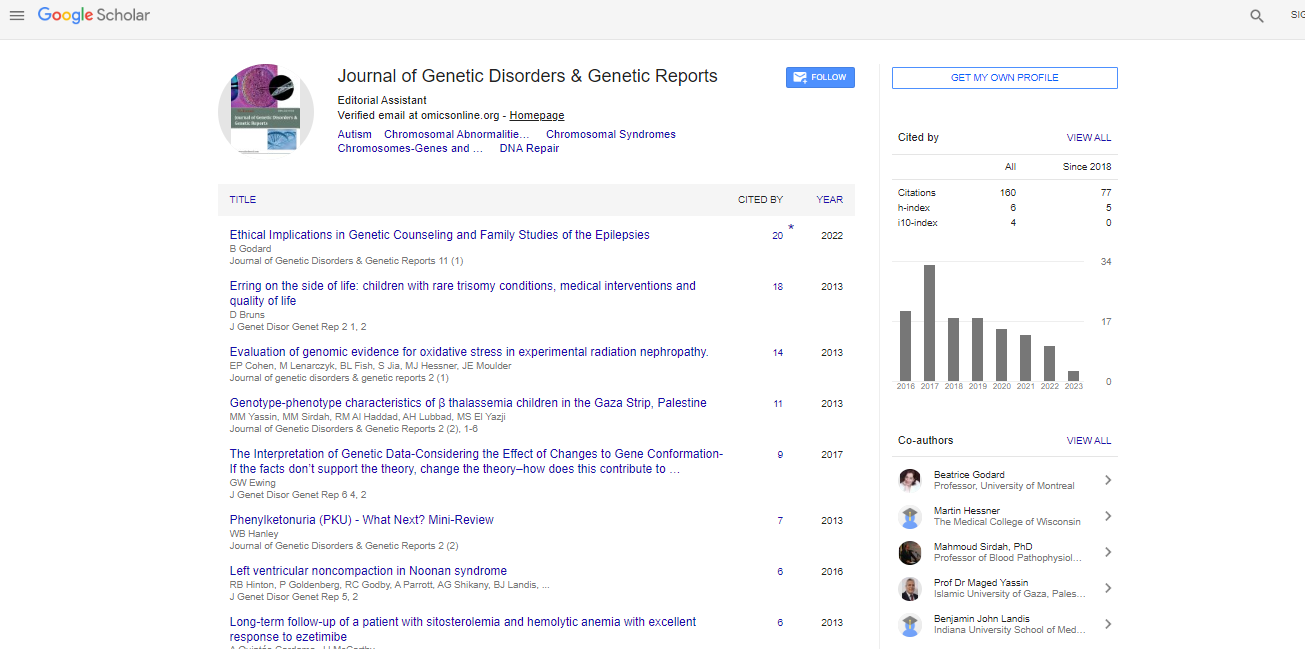Commentary, J Genet Disor Genet Rep Vol: 12 Issue: 3
Genetic Basis of Phenotypic Variation: Exploring Individual Differences at the Molecular Level
Eli Bruce*
1Department of Genetics, University of Groningen, Groningen, Netherlands
*Corresponding Author: Eli Bruce,
Department of Genetics, University of
Groningen, Groningen, Netherlands
E-mail: bruceeli@gmail.com
Received date: 15 May, 2023, Manuscript No JGDGR-23-106022;
Editor assigned date: 17 May, 2023, PreQC No JGDGR-23-106022 (PQ);
Reviewed date: 01 June, 2023, QC No JGDGR-23-106022;
Revised date: 08 June, 2023, Manuscript No JGDGR-23-106022 (R);
Published date: 16 June, 2023, DOI: 10.4172/2576-1439.1000207
Citation: Bruce E (2023) Genetic Basis of Phenotypic Variation: Exploring Individual Differences at the Molecular Level. J Genet Disor Genet Rep 12:3.
Abstract
Description
The study of the genetic basis underlying phenotypic variation among individuals has revolutionized our understanding of human diversity. Each person possesses a unique set of physical and behavioral traits shaped by a complex interplay of genes and environment. By exploring the molecular mechanisms and genetic variations that contribute to phenotypic variation, scientists are unraveling the intricacies of human biology, evolution, and disease susceptibility.
Genetic variation
Human genetic variation arises from differences in Deoxyribonucleic Acid (DNA) sequences within the genome. These variations can occur at the level of individual nucleotides (single nucleotide polymorphisms), larger structural variants, or epigenetic modifications. Each person's unique combination of genetic variants contributes to the diversity of traits observed among individuals. By studying these genetic variations and their distribution within populations, researchers gain insights into the genetic basis of phenotypic differences.
Genome-wide association studies
Genome-Wide Association Studies (GWAS) have revolutionized the field of genetics by providing a powerful tool to identify genetic variants associated with specific traits or diseases. GWAS involves comparing the genetic profiles of thousands of individuals to identify genetic markers or regions that are statistically linked to a particular phenotype of interest. These studies have successfully identified numerous genetic variants associated with a wide range of traits, including height, weight, eye color, disease susceptibility, and response to medications.
Functional genomics
Understanding the functional implications of genetic variation requires studying the effects of these variants on gene expression, protein function, and biological pathways. Functional genomics techniques, such as transcriptomics, proteomics, and epigenomics, enable researchers to explore how genetic variations influence gene activity and protein production. These approaches provide insights into the molecular mechanisms underlying phenotypic variation, shedding light on the biological processes that drive individual differences.
Gene-environment interactions
Phenotypic variation is not solely determined by genetic factors but also influenced by environmental interactions. Genes can modulate an individual's sensitivity to environmental cues and shape their response to external stimuli. Gene-environment interactions can modify gene expression patterns, protein function, and physiological responses, leading to diverse phenotypes even among individuals with similar genetic backgrounds. Understanding these interactions is crucial for comprehending the complex relationship between genes, environment, and phenotypic variation.
Implications for human health
Unraveling the genetic basis of phenotypic variation has profound implications for human health. By identifying genetic variants associated with disease susceptibility, researchers can develop predictive models, diagnostic tools, and targeted therapies. Personalized medicine leverages this genetic knowledge to tailor medical interventions based on an individual's genetic profile, optimizing treatment efficacy and minimizing adverse effects. The study of the genetic basis of phenotypic variation paves the way for precision medicine, revolutionizing healthcare practices.
Ethical considerations and future perspectives
As we deepen our understanding of the genetic basis of phenotypic variation, ethical considerations regarding privacy, consent, and potential misuse of genetic information become increasingly important. Responsible research practices, informed consent, and robust data protection protocols are vital to ensure the ethical use of genetic data. Moving forward, future directions in this field involve exploring the functional implications of genetic variants, integrating data, and unraveling the complex genetic architecture of complex traits.
Conclusion
Studying the genetic basis of phenotypic variation offers valuable insights into the complexity of human diversity. By deciphering the genetic variations that contribute to individual differences, researchers uncover the molecular mechanisms underlying phenotypic variation. This knowledge has far-reaching implications for human health, personalized medicine, and our understanding of the fundamental biology of life. Ethical considerations and responsible research practices are crucial to navigate the evolving landscape of studying the genetic basis of phenotypic variation while ensuring the equitable and responsible use of genetic information.
 Spanish
Spanish  Chinese
Chinese  Russian
Russian  German
German  French
French  Japanese
Japanese  Portuguese
Portuguese  Hindi
Hindi 



